选修6unit1虚拟语气
2020_2021学年高中英语课时作业(二)Unit1ArtSectionⅡGrammar—虚拟语气(一)(含解析)新人教版选修6
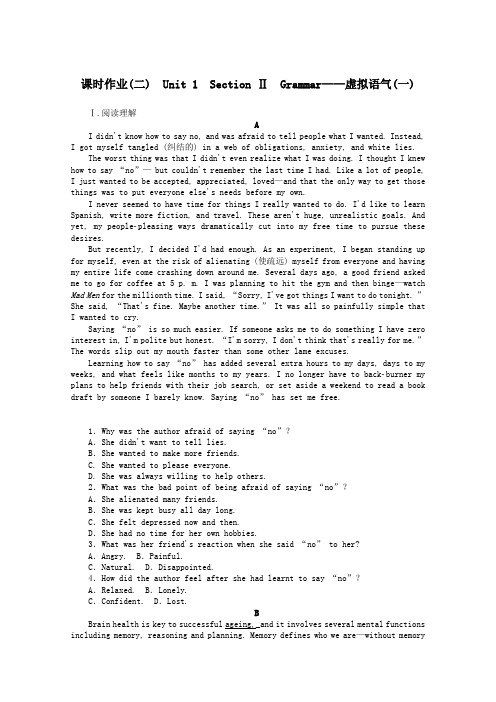
课时作业(二) Unit 1 Section ⅡGrammar——虚拟语气(一)Ⅰ.阅读理解AI didn't know how to say no, and was afraid to tell people what I wanted. Instead, I got myself tangled (纠结的) in a web of obligations, anxiety, and white lies.The worst thing was that I didn't even realize what I was doing. I thought I knew how to say “no”— but couldn't remember the last time I had. Like a lot of people, I just wanted to be accepted, appreciated, loved—and that the only way to get those things was to put everyone else's needs before my own.I never seemed to have time for things I really wanted to do. I'd like to learn Spanish, write more fiction, and travel. These aren't huge, unrealistic goals. And yet, my peoplepleasing ways dramatically cut into my free time to pursue these desires.But recently, I decided I'd had enough. As an experiment, I began standing up for myself, even at the risk of alienating (使疏远) myself from everyone and having my entire life come crashing down around me. Several days ago, a good friend asked me to go for coffee at 5 p. m. I was planning to hit the gym and then binge—watch Mad Men for the millionth time. I said, “Sorry, I've got things I want to do tonight. ” She said, “That's fine. Maybe another time.” It was all so painfully simple that I wanted to cry.Sayi ng “no” is so much easier. If someone asks me to do something I have zero interest in, I'm polite but honest. “I'm sorry, I don't think that's really for me.” The words slip out my mouth faster than some other lame excuses.Learning how to say “no” has add ed several extra hours to my days, days to my weeks, and what feels like months to my years. I no longer have to backburner my plans to help friends with their job search, or set aside a weekend to read a book draft by someone I barely know. Saying “no” h as set me free.1.Why was the author afraid of saying “no”?A.She didn't want to tell lies.B.She wanted to make more friends.C. She wanted to please everyone.D. She was always willing to help others.2.What was the bad point of being afraid of saying “no”?A.She alienated many friends.B.She was kept busy all day long.C.She felt depressed now and then.D.She had no time for her own hobbies.3.What was her friend's reaction when she said “no” to her?A.Angry. B.Painful.C.Natural. D.Disappointed.4.How did the author f eel after she had learnt to say “no”?A.Relaxed. B.Lonely.C.Confident. D.Lost.BBrain health is key to successful ageing,_and it involves several mental functions including memory, reasoning and planning. Memory defines who we are—without memorywe have no past, cannot plan for the future and are unable to enjoy the present. Our reasoning and planning skills help us create and maintain healthy lifestyle habits that protect our bodies and minds.People are living much longer than ever before. Those born in 1900 would have been lucky to reach their 50th birthday. Today, life expectancy in many countries exceeds 80, but unfortunately agerelated diseases such as Alzheimer's and diabetes can diminish quality of life.As we age, brain cells that normally fight off infection and repair tissue begin to attack healthy brain cells. This causes inflammation (炎症) and can lead to cognitive deficits and disease. But adopting healthy lifestyle habits, such as eating fish, getting a good night's sleep and doing physical exercise, can slow and even reverse the process.The typical 45yearold has worse memory than the 25yearold, and our brains will continue to decline if we do nothing to protect them. However, if we intervene (干预)early, we can slow the decline. It's always easier to protect a healthy brain than to try to repair damage once it is extensive.Although there is a genetic component to healthy ageing, lifestyle habits may be more critical than genes. The landmark MacArthur Studies of Successful Ageing showed t hat, on average, nongenetic factors are more important than genetics in determining how well and long we live, suggesting that we have more control than we realize over remaining healthy as we get older.5.What does the underlined word “ageing” mean in the first paragraph?A.The process of getting old.B.Mental functions.C.Life expectancy.D.Healthy lifestyle.6.What can we do to slow the decline of our brains?A.Enjoying the present.B.Staying in a good mood.C.Working as long as possible.D.Adopting healthy lifestyle habits.7.What does MacArthur Studies of Successful Ageing suggest?A.Agerelated diseases affect our quality of life.B.Genetic factors determine how well we live.C.We can do something to live better and longer.D.Sometimes we don't know how to keep healthy.8.What is the main idea of the text?A.Daily habits determine your longevity.B.You should protect your brains early.C.Good health results from right food.D.Body exercise also benefits mental health.Ⅱ.完形填空Cathy and I met a few days after I first arrived in China. I was walking around the English academy which had __1__ me, introducing myself to my new colleagues, most of __2__ were Chinese. I entered Cathy's __3__, saw her, and immediately felt some __4__ and happy emotions (情感). She __5__ so kind, yet professional. I couldn't stop smiling like a (n) __6__. After introducing ourselves and exchanging __7__ questions.I asked whether she knew anyone who could __8__ me in Chinese. She said she could, and agreed to meet outside work.We sometimes exchanged nonromantic texts in the evening. After a couple __9__,I invited her to my apartment. I was very nervous. Later, I asked if she would consider __10__ me. She didn't immediately __11__, but said she would tell me the next day.I found it very difficult to __12__, but I did.This was a __13__ difference. In American culture, starting to date someone is not a big, important __14__, but I think in Chinese culture it is. Well, she said “yes”, and so we spent lots of time together, and __15__ love. I asked her to __16__ me about 6 or 7 months later.We had a Chinese style __17__ in Cathy's hometown. My parents came, and it was great. It went really __18__. Everyone was very __19__. It was a very fun and interesting __20__ for me, very different from a Western style wedding.1.A.hired B.firedC.educated D.hated2.A.which B.themC.whom D.what3.A.life B.classroomC.bedroom D.heart4.A.interesting B.awkwardC.disappointed D.looked5.A.talked B.taughtC.smelled D.looked6.A.father B.actorC.fool D.genius7.A.basic B.seriousC.practical D.strange8.A.match B.persuadeC.communicate D.tutor9.A.hours B.weeksC.years D.decades10.A.dating B.teachingC.cheering D.praising11.A.leave B.argueC.agree D.answer12.A.sleep B.laughC.wait D.complain13.A.temporary B.nationalC.cultural D.political14.A.risk B.decisionC.trouble D.fault15.A.traded B.fell inC.talked about D.broke in16.A.marry B.wait forC.test D.go with17.A.breakup B.partyC.gettogether D.wedding18.A.steady B.wellC.annoying D.fast19.A.curious B.politeC.sad D.happy20.panion B.lessonC.experience D.story课时作业(二)Ⅰ.阅读理解A【语篇解读】本文是一篇记叙文。
2020版新一线高考英语新题型人教版一轮复习教学案第1部分选修6Unit1Art含答案

Unit 1Art[单词拼写应用]核心单词1.typical adj.典型的;有代表性的2.evident adj.明显的;明白的3.adopt vt.采用;采纳;收养4.attempt n.努力;尝试;企图vt.尝试;企图5.figure n.画像;身材;数字6.predict vt.预言;预告;预测7.appeal v i.有感染力;呼吁;求助vt.将……上诉n.呼吁;恳求8.reputation n. 名声;名誉9.exhibition n. 展览;陈列;展览会10.effectively adv.有效地[语境运用]用所给词的适当形式填空。
1.Attempting(attempt) to change someone else's attitude towards life is a waste of time and energy.2.Celebrities and public figures(figure) support the event by making appearances on comic TV shows.3.It is now still impossible to predict(predict) when and where an earthquake will break out. 4.As a child without parents,Jerry was adopted(adopt) by a rich couple when he was five. 5.The Students' Union appeals (appeal) to us students to do housework in our spare time.拓展单词1.faith n.信任;信心;信念→faithful adj.忠实的;守信的→faithfully adv.忠实地2.possess vt.拥有;具有;支配→possession n.(尤作复数)所有;财产3.coincidence n.巧合(的事);(事情、口味、故事等)相合→coincident adj.同时发生的4.prefer v.更喜欢;偏爱→preference n.喜爱;偏爱5.aim n.目标;目的vi.& vt.瞄准;(向某方向)努力→aimless adj.无目标的;无目的的→aimlessly adv.漫无目的地;无目标地6.sign v.签名→signature n.署名;签字[语境运用]用所给词的适当形式填空。
人教版高中英语选修六第一单元课件Languagepoints

8. A conventional artist of this period was not interested in showing nature … conventional adj. (traditional)常规的, 通常的,传统的;受俗套束缚的, 按 习惯办事的, 陈旧的,形式上的
e.g. The chairman made a few conventional remarks. 主席说了几句客套话。
6. consequently adv. 所以,因此 consequent adj. 随后的,相应的 consequence n. 后果
e.g. Mr Foster has never been to China. Consequently, he knows very little about it. “福斯特先生从未去过中国, 所以 对中国了解的很少。”
【考例】
If I _____ plan to do anything I wanted
to, I’d like to go to Tibet and travel
through as much of it as possible.
would
B. could
C. had to
D. ought to
【点拨】根据句子提供的语境,这是 一个与现在事实相反的虚拟语气,if 从句的谓语要用一般过去式;再根据 句意“要是我能计划做我想做的事, 我就……”,选could。
conventional weapons 常规武器
a conventional design 传统图案
conventional opinions 旧观念
9. A typical picture at this time was full of religious symbols, …
人教新课标选修6 unit1 art -If虚拟语气

If I …, I would ….
travel around the world
What would you do if you had one million dollars?
If I …, I would ….
give it to the zoo
What would you do if you had one million dollars?
Sentence completion (4’)
• If you _____________________, had followed my advice you would have seized the chance and got the qualification to work in the big company. (follow)
If I …, I would ….
give it to charity (慈善机构)
Let’s play a game!
Let’s make up an interesting story together!
Model
Student 1: If I were a fish, I would swim in the sea. Student 2:If I swam in the sea, I would meet many fish. Student 3: If I met many fish, I would give them food. Student 4: If I gave them food, … would …. Student 5:
If I am free, I will visit you.(真实条件句)
If I were a bird, I would fly into the sky.
选修6 Unit 1 & Unit 2 虚拟语气
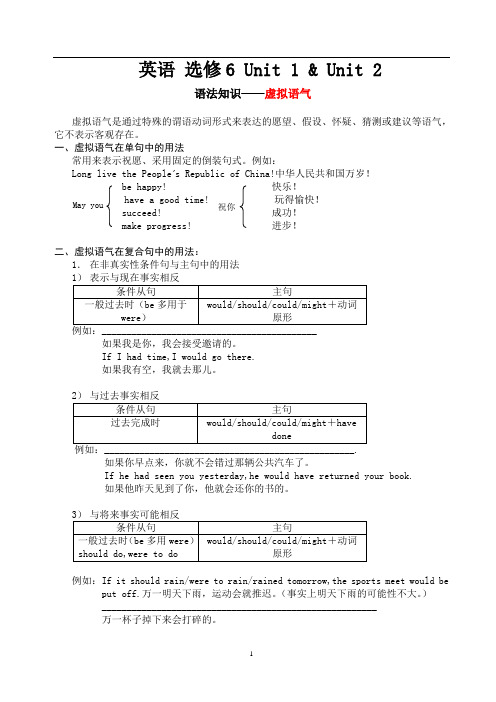
英语 选修6 Unit 1 & Unit 2语法知识——虚拟语气虚拟语气是通过特殊的谓语动词形式来表达的愿望、假设、怀疑、猜测或建议等语气,它不表示客观存在。
一、虚拟语气在单句中的用法常用来表示祝愿、采用固定的倒装句式。
例如:Long live the People s Republic of China!中华人民共和国万岁!be happy! 快乐!have a good time! 玩得愉快! succeed! 成功!make progress! 进步!二、虚拟语气在复合句中的用法:1. 在非真实性条件句与主句中的用法如果我是你,我会接受邀请的。
If I had time,I would go there.如果我有空,我就去那儿。
如果你早点来,你就不会错过那辆公共汽车了。
If he had seen you yesterday,he would have returned your book.如果他昨天见到了你,他就会还你的书的。
例如:If it should rain/were to rain/rained tomorrow,the sports meet would be put off.万一明天下雨,运动会就推迟。
(事实上明天下雨的可能性不大。
)_______________________________________________________万一杯子掉下来会打碎的。
May you 祝你4)省略if的条件句在书面语中,非真实条件句中有were, had, should时,可以省略if,而把were, had, should 放在主语前,用倒装结构。
Were it necessary, I might go without delay.如果需要的话,我可以立即去。
(= If it were necessary......)_____________________________________________________你要是听了我的建议,就不会考试不及格了。
2019_2020学年高中英语unit1artperiodfourgrammar_subjunctivemood1教案含解析新人教版选修6
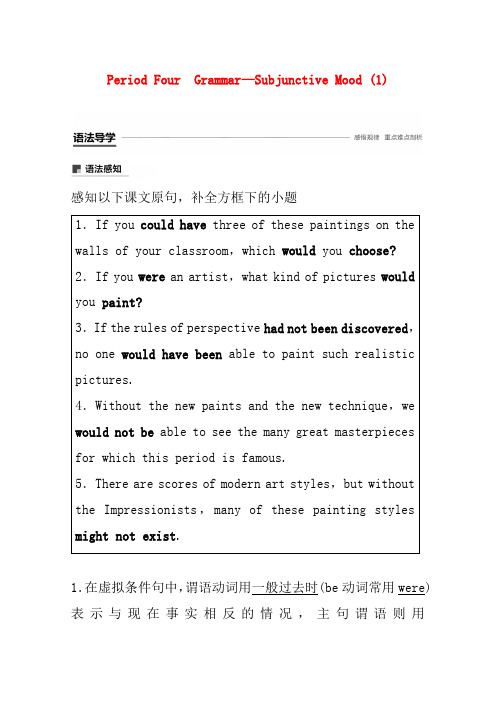
Period Four Grammar—Subjunctive Mood (1)感知以下课文原句,补全方框下的小题1.在虚拟条件句中,谓语动词用一般过去时(be动词常用were)表示与现在事实相反的情况,主句谓语则用“would/should/could/might+动词原形”表示。
(如句1、2、4和5)2.在虚拟条件句中,谓语动词一般用过去完成时表示与过去事实可能不符的情况,主句则用“would/should/could/might+have+过去分词”表示。
(如句3)虚拟语气是英语考查的重点之一。
虚拟语气用来表示说话人所说的话并不是事实,而是一种假设、愿望、怀疑或推测。
其使用情况如下:一、虚拟语气在if条件从句中的用法注意:1.虚拟条件句中有had,should,were时,可将if去掉,把had,should,were提到主语之前,即倒装结构,如:Were theyherenow,they couldhelp us.如果现在他们在这里,他们就能帮助我们。
HadIworked harderatschool,I’dhavegot abetterjob.如果我在学校学习更努力的话,就会找到一份更好的工作。
Shouldheagree togothere,we wouldsend himthere.要是他答应去的话,我们就派他去。
2.有时条件从句表示的动作和主句表示的动作发生的时间不一致,这类句子称为错综时间条件句。
此时主、从句动词的形式应根据各自所表示的时间进行调整。
Ifhe hadtaken myadvicethen,he wouldn’tbe introublenow. 如果那时他听取了我的建议,现在他就不会有麻烦了。
Ifshe wereto leave,I wouldhaveheard aboutit.如果她要走,我会听说的。
3.某些介词或介词短语,如butfor,without,副词或连词,如otherwise,however,or,but等也可以表达一个暗含的虚拟的条件,这种情况下要仔细阅读上下文的语境。
虚拟语气(经典课件)
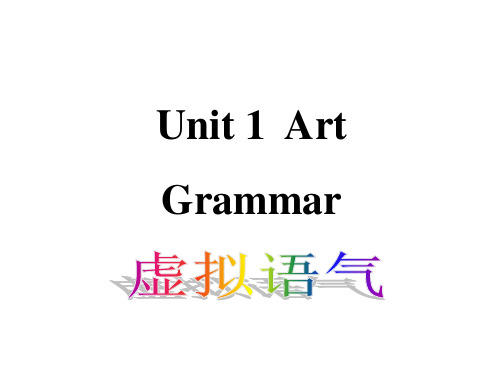
not sleep He ordered that we ____________.
4)他要求我们按时读完这本书。
should finish He demanded that we __________ the book on time.
8、虚拟语气在主语从句的使用
It is suggested / ordered / insisted / demanded / requested ·· that + S + (should) + V ·· ··
13. would rather that
did / were had done
I would rather you _____ me now. paid I would rather you ________ here than __________. went away remained I would rather you ____________ that. hadn’t done I would rather you __________ there too. had gone
6、表示愿望, 期待的虚拟语气 S + wish S did / were (that) If only S had done
1) 我要是记得他的地址就好了.
与现在相反 与过去相反
I wish that I remembered his address. If only I remembered his address.
1、当suggest译成“建议”, insist译成“坚持…做……”时, 从句用(should)
do… insist译成“坚持认为”时,从
语法:虚拟语气(一)在if 条件从句中的用法;词汇:选修6 (Unit 1)中的重点词句与表达
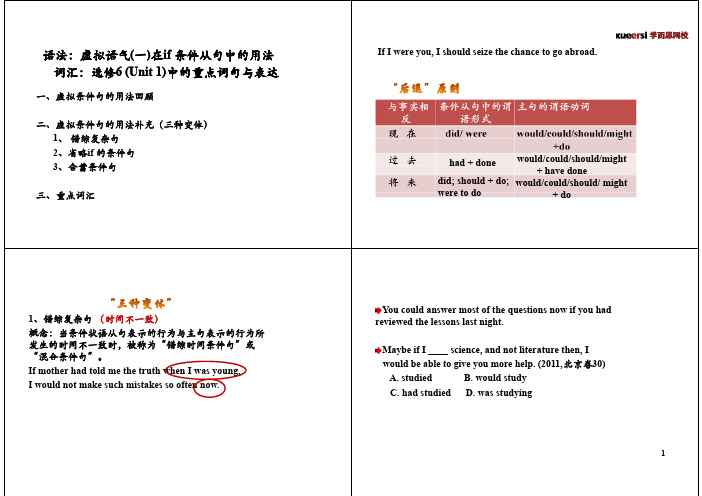
had+done would/could/should/might had + done+ have donedid; should + do; ere to do would/could/should/ mightdwere to do+ doYou could answer most of the questions now if you had reviewed the lessons last night.Maybe if I ____ science, and not literature then, I would be able to give you more help. (2011,北京卷30)A. studiedB. would studyC. had studiedD. was studying_____ I you, I would go with him to the party.But for their help, we ____ the program in time. (2009,安安徽卷,I was ill that day. Otherwise, I would have taken part in the sports meeting.They would have resisted but that they lacked courage. (= They would have resisted if they hadn’t lackedA A man who stopped drinking water would be dead in about 3days.possession possess [pə'zes]vt. 拥有;具有;支配有有支Rich people wanted to possess their own paintings, sothey could decorate the superb palaces and great houses.they could decorate the superb palaces and great houses(选修6, P 2-18)1.2.The , painter does not attempt to paint objects as we see them with our eyes, but instead concentrates on certain qualities of the object, using colour, line and shape to represent them. (选修6, P3-53)1k ff t t ith t di1.make an effort, try, esp. without succeedingHe attempted to leave but stopped. 【L.C】attempt to do; attempt doing总结一、虚拟条件句的用法回顾二、虚拟条件句的用法补充(三种变体)1、错综复杂句2、省略if 的条件句条件3、含蓄条件句三、重点词汇。
- 1、下载文档前请自行甄别文档内容的完整性,平台不提供额外的编辑、内容补充、找答案等附加服务。
- 2、"仅部分预览"的文档,不可在线预览部分如存在完整性等问题,可反馈申请退款(可完整预览的文档不适用该条件!)。
- 3、如文档侵犯您的权益,请联系客服反馈,我们会尽快为您处理(人工客服工作时间:9:00-18:30)。
if虚拟条件句 表示条件是虚拟的或几 乎无法实现的, 采用虚拟语气。
if 引导的虚拟条件句
①与现在事实相反 ②与过去事实相反 ③与将来事实相反
与现在事实相反
If I had a great deal of money, I would buy a villa (别墅) for my parents.
与过去事实相反
If he had learnt how to swim, he would not have been trapped on
that island for four years.
2.一般条件句中的虚拟语气
时 If 条件句 间
主
句
would 过 should +have done sth had done 去 could might
如果上天能够再给我一次机会,我 会对那个女孩说:“我爱你” 。 If I had one more chance, I would say to the girl “I love you”.
语气 英语语气分为三种不同的语 气:陈述语气,祈使语气和 虚拟语气。不同的语气用动 词的不同形式来表示。
陈述语气用来陈述一个事实,或提出 一个看法. 1. I went to the theatre yesterday. 2. Jack hasn't come back home yet.
如果他明天来的话,我会告诉他这件事
If he came/were to come/ should come here tomorrow, I would tell him about it.
1、一般条件句中的虚拟语气 时 间 If 条件句 主 句
would did / were should + do sth 将来 should do could were to do might
与过去事实相反
If the young man had driven more
carefully, he would not have caused the car accident yesterday.
与过去事实相反
If he had got up earlier , he could have caught the train.
PRACTICE 2: Fill in the blanks.
had been (be) more a.If Tom ________ careful in the exam, he would have passed (pass) it ________________ already. b.If you _______ had got (get) up would have caught earlier, you________________ (catch) the first train.
(see)me,he___________(know) would know me.
虚拟语气辨析: were 1.I should do it if I was you. 2.If my father were here now,he will tell me what to do. would
3.If I knew her telephone number,I would have called her . had known 4.If it hadn’t rained might have come yesterday,he might come here. 5.I don’t think I shall fail,but if I fail,I would try it again.
If I have another chance, I will visit China again.
What will you do if it rains tomorrow?
I will sleep at home if it rains tomorrow.
if真实条件句用于陈述语气,假 设的情况很有可能发生,if是 “如果”的意思
PRACTICE 3: Fill in the blanks
would happen a.What ____________ (happen) if you should get up/got up/were to get up _________________________ (get up) too late tomorrow?
1、一般条件句中的虚拟语气 时 间 If 条件句 主 句
过去
had done
would should could might would should could might
+have done sth
were/did 现在
did / were 将来 should do were to do
+ do sth
b. If Robots _____________ were to control
(control) the world some day, there ________ would be (be) no
friendship.
saw/should see/were to see c.If he___________________
would should + do sth could Might
Guide 2:
阅读虚拟语气在条件状语从句
的运用,并回答下列问题:
1)什么是错综时间虚拟条件句? 2)什么是含蓄虚拟条件句? 3)省略 if 的条件从句又是指什么?
主句与从句的动作发生的时间 不一致,这叫做错综虚拟条件句.这
时主从句动词的虚拟语气形式因
if 条件句中的虚拟语气 时 间
If 条件句 主 句 would should do sth could might
现在 were /did
PRACTICE 1: Fill in the blanks.
a. If theywere ____ (be) here, they __________(take) your advice. would take b. If the world-war _____ burst (burst) out again, what _____________ would happen (happen) to our people on earth?
Unit 1
Grammar
subjunctive mood
高考虚拟语气分析: 2014年全国各省高考5道 2015年全国各省高考8道 2016年全国各省高考8道 2017年全国各省高考8道 其中北京,新课标每年都有一,二道
Study Aims:
1. 了解英语中的三种语气。并正 确理解虚拟语气的含义 2. 理解并掌握虚拟语气在条件状 语从句中的应用。
省略 if 的条件从句 当从句中有 were, had 或 should 时,可省略if ,而把它们 放在句首.若有not,not保留 在原处.
If I were to meet him tomorrow, I should ask him about it. Were I to meet himtomorrow,… If he should fail in the experiment this time, he would try again. Should he fail in the experiment,he…
c. If I _______ had met (meet) you yesterday, we would ______________ have gone (go) to the concert together.
反与 将 来 事 实 相 If I met Obama some day, I would shake hands with him.
Q:What’s the difference between the two sentences?
If I am free, I will visit you.
→
If I were a bird, I would fly into the sky. (虚拟条件句)
→
(真实条件句)
If we have chances, we can have further cooperation.
祈使语气用来表示请求,命令,警告或劝告 等。 1. Let me do it. 2. Please keep quiet in the reading room.
虚拟语气用来表示说话人所说不 是一个事实,而是一种假设,或表 示说话人的愿望(不可能实现)、 要求、命令、建议等
a. if真实条件句 表示条件是真的或 有可能实现的, 采用陈述语气。 b. if虚拟条件句 表示条件是虚拟的或几 乎无法实现的, 采用虚拟语气。
时间不同而不同, 。 If you had asked him yesterday,
you would know what to do now.
If the staff had been more careful,
the supermarket would not be on fire now.
If I were you,I would have taken his advice. If it had rained last night (过 去), it would be very cold today (现在).
failed
invited/should invite/were to invite 1.If you________ (invite)him to come here tomorrow,I would also come. had driven 2.If he__________(drive) more carefully,he would not have had the car accident yesterday. were 3.If there______(be)no air, die people would _________(die).
